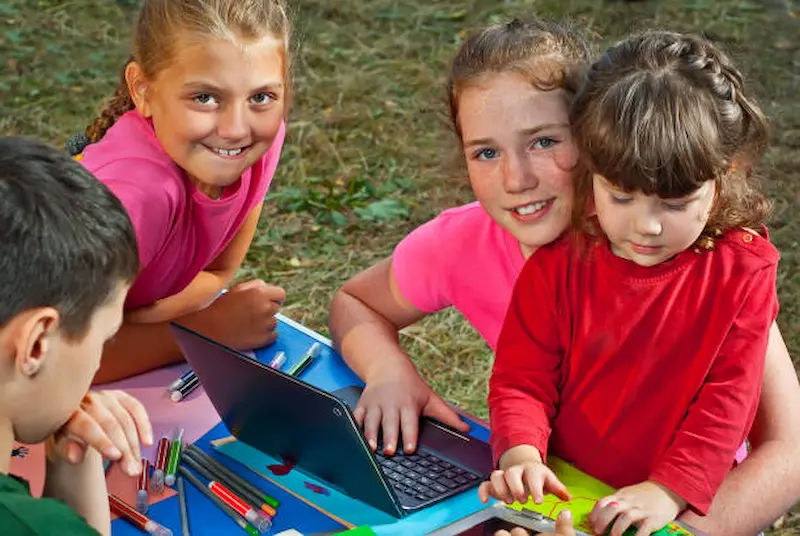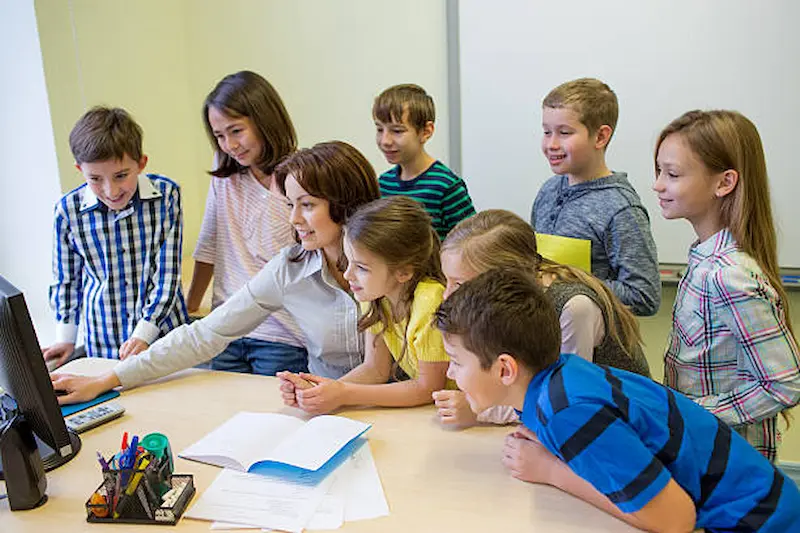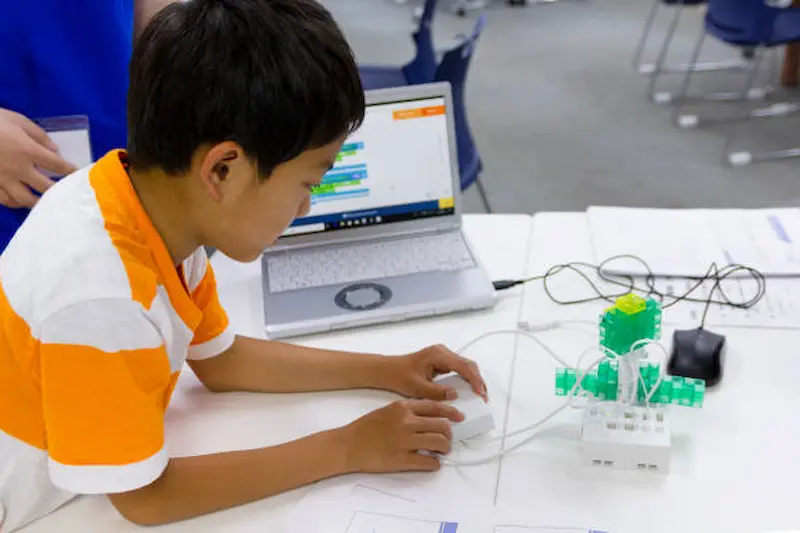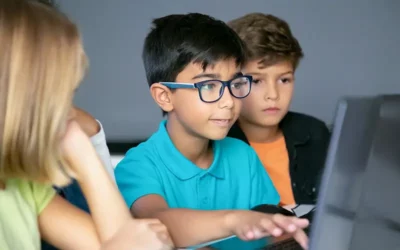Coding camps for kids offer a dynamic and interactive learning environment where young learners can acquire foundational coding skills. These camps often utilize engaging, age-appropriate curricula to make coding concepts accessible and enjoyable. Through hands-on projects, games, and activities, kids develop problem-solving abilities and logical thinking. Coding camps foster creativity and teamwork, providing a supportive space for children to explore the exciting world of technology.
In this blog, we will discover the transformative world of Coding Camps for Kids, where young minds embark on a journey of creativity and skill development through engaging, hands-on coding experiences.
Table of contents
- Benefits of Coding Camps
- Types of Coding Camps
- Popular Coding Languages Taught
- How Coding Camps Work
- Choosing the Right Coding Camp
- Overcoming Challenges
- Integrating Coding into School Curriculum
- Coding Camps vs Traditional Education
- Coding Camps and Parental Involvement
- Challenges in Coding Camps
- Coding Camps as a Global Phenomenon
- The Future of Coding Camps
- Conclusion
- Frequently Asked Questions ( FAQs )
Benefits of Coding Camps

A. Cognitive Development:
Coding camps significantly contribute to child cognitive development in participants. The process of learning to code involves logic, sequencing, and pattern recognition, fostering mental agility and analytical thinking. These cognitive skills extend beyond coding, enhancing overall problem-solving capabilities and contributing to the well-rounded development of young learners.
B. Problem-Solving Skills:
Coding inherently involves breaking down complex problems into manageable parts. By tackling coding challenges, participants, including those in coding camps, hone their problem-solving skills, cultivating a mindset that seeks innovative solutions.
This transferable skill set not only enhances their coding abilities but also becomes valuable in various academic and real-world scenarios, contributing to the development of leadership skills for kids.
C. Creativity Enhancement:
Coding camps nurture creativity by encouraging participants to think imaginatively and experiment with different solutions. Writing code involves designing and implementing unique solutions to problems, fostering a creative mindset that is crucial in the rapidly evolving fields of technology and innovation.
Types of Coding Camps

A. Summer Coding Camps:
These immersive programs provide students with a focused learning experience during summer breaks. Typically held for several weeks, they offer in-depth coding courses, fostering a collaborative environment for skill development. Participants engage in hands-on projects, gaining practical experience that extends beyond the classroom.
B. Weekend Workshops:
Catering to busy schedules, weekend workshops provide condensed coding sessions over Saturdays and Sundays.
These short, intensive programs are designed for quick skill enhancement, making them ideal for students and professionals seeking to acquire coding proficiency without committing to long-term courses.
C. Online Coding Programs:
In the digital era, the popularity of online coding programs, particularly online coding classes for kids, has surged. These flexible courses enable participants to learn at their own pace, accessing materials and tutorials from anywhere. With interactive platforms, coding challenges, and virtual collaboration, online programs cater to diverse learners worldwide, democratizing access to coding education.
Popular Coding Languages Taught

A. Scratch:
Widely used in introductory coding programs for kids, Scratch, a prominent example of scratch coding for kids, employs a visual, block-based interface. It fosters creativity by allowing learners to create interactive stories, games, and animations without the complexities of text-based coding. This approach makes coding accessible and engaging for children, providing a solid foundation for their exploration of programming concepts.
B. Python:
Known for its readability and versatility, Python is a popular choice in coding camps, including Python coding for kids. Its simplicity makes it accessible for beginners, yet it’s powerful enough for complex applications.
Python’s widespread use in the industry enhances its relevance for aspiring coders, providing a valuable skill set for young learners in coding programs.
C. JavaScript:
Essential for web development, JavaScript is often taught in coding camps focusing on building interactive and dynamic websites. As a client-side scripting language, JavaScript enables real-time interactions, making it a fundamental skill for aspiring web developers.
How Coding Camps Work

A. Curriculum Overview:
Coding camps structure their curriculum to impart a comprehensive understanding of programming languages and concepts, including activities for kids. They often begin with fundamentals before progressing to advanced topics, ensuring a well-rounded education. The curriculum is frequently updated to align with industry trends, keeping participants abreast of the latest technologies and providing a dynamic and engaging learning experience for young learners.
B. Hands-On Projects:
Emphasizing practical application, coding camps incorporate hands-on projects. These projects simulate real-world scenarios, allowing participants to implement their knowledge.
This experiential learning approach enhances problem-solving skills, creativity, and confidence, crucial for a successful coding career.
C. Team Collaborations:
Recognizing the importance of teamwork in the tech industry, coding camps frequently include collaborative projects. Participants work together, mirroring industry dynamics, to develop solutions, share ideas, and refine their interpersonal and communication skills—a vital component in the ever-evolving world of coding and programming.
Choosing the Right Coding Camp

A. Age-Appropriate Programs:
When selecting a coding camp, consider age-appropriate programs tailored to the participant’s developmental stage. Camps often customize content to suit varying age groups, ensuring that the curriculum is engaging and comprehensible for participants, whether they are children, teenagers, or adults.
B. Skill Level Considerations:
Coding camps cater to a spectrum of skill levels, from beginners to advanced coders. Assess your proficiency to choose a camp that aligns with your current skills while offering opportunities for growth. Tailoring the experience to your expertise ensures an optimal learning journey.
C. Camp Reputation and Reviews:
Researching a coding camp’s reputation and reading reviews provides insights into the quality of education and overall experience.
Consider testimonials from previous participants, as well as any industry endorsements, to make an informed decision about the camp’s effectiveness and suitability for your learning goals.
Overcoming Challenges
A. Addressing Technological Barriers:
To ensure inclusivity, coding camps work to overcome technological disparities by providing access to devices and establishing supportive infrastructure. Scholarships, partnerships, and community outreach initiatives further bridge the digital divide, enabling a broader spectrum of participants to engage in coding education.
B. Encouraging Diversity in Coding Camps:
Acknowledging the importance of diversity, coding camps actively promote inclusivity. Outreach programs, mentorship initiatives, and diverse role models help counteract underrepresentation in the tech industry, fostering an environment where individuals from various backgrounds feel welcome.
C. Balancing Screen Time:
Recognizing concerns about excessive screen time, coding camps implement strategies to balance hands-on coding with offline activities. Breaks, physical exercises, and interactive discussions mitigate the potential drawbacks of prolonged screen engagement, promoting a holistic and sustainable learning experience.
Integrating Coding into School Curriculum

Incorporating coding into the school curriculum prepares students for the digital age. Schools can offer coding classes or integrate coding concepts across subjects, fostering critical thinking and problem-solving skills. This interdisciplinary approach not only equips students with technical proficiency but also cultivates creativity. By embracing coding education, schools empower students to navigate an increasingly technology-driven world, enhancing their adaptability and future career prospects.
Coding Camps vs Traditional Education
A. Complementary Skills:
Coding camps and traditional education are symbiotic, offering complementary skills, including coding for kids free. While traditional education provides a broad academic foundation, coding camps specialize in cultivating practical, in-demand coding skills.
The combination equips students with a well-rounded skill set, enhancing their adaptability in a rapidly evolving job market.
B. Addressing Gaps in Traditional Education:
Coding camps address gaps in traditional education by focusing on emerging technologies. They bridge the divide, ensuring students are not only proficient in traditional subjects but also equipped with the technological literacy required for contemporary careers.
C. The Role of Coding in the Modern World:
In the modern world, coding is a critical skill. Coding camps play a pivotal role in emphasizing the importance of coding as a core competency, preparing students to navigate and contribute to the tech-centric landscape of today and the future.
Coding Camps and Parental Involvement

A. Understanding the Learning Process:
Parents play a pivotal role in supporting their child’s coding journey by understanding the learning process, especially in the context of early childhood learning. Familiarity with the curriculum and milestones helps facilitate meaningful discussions about the skills being acquired and challenges faced during coding camps. This collaborative approach ensures a more enriching experience for young learners as they delve into the world of coding.
B. Supporting Continued Learning at Home:
Encouraging continued learning at home reinforces coding skills. Parents can provide a conducive environment, access to coding resources, and engage in coding-related activities to strengthen their child’s grasp of programming concepts beyond the camp.
C. Parental Feedback and Involvement:
Coding camps benefit from parental feedback, incorporating parenting advice into their approach. Regular communication channels enable parents to share insights, concerns, and observations, fostering a collaborative relationship. This involvement ensures a holistic approach to a child’s coding education, creating a supportive ecosystem that enhances the overall learning experience.
Challenges in Coding Camps

Despite their benefits, coding camps, including free coding for kids, may face challenges such as diverse skill levels among participants, necessitating personalized approaches. Limited resources and access to technology can pose obstacles, affecting the overall learning experience. Striking a balance between theoretical and hands-on learning can be challenging. Additionally, ensuring inclusivity and diversity in the coding camp environment requires ongoing efforts. Overcoming these challenges involves adaptability, innovative teaching methods, and a commitment to fostering an inclusive and supportive learning atmosphere.
Coding Camps as a Global Phenomenon
Coding camps have become a global phenomenon, transcending geographical boundaries to meet the growing demand for digital literacy. This educational trend reflects a universal recognition of coding’s importance in shaping the workforce of the future. With camps accessible online and in diverse locations, this global movement ensures that individuals worldwide have the opportunity to harness coding skills, contributing to a more interconnected and technologically proficient global community.
The Future of Coding Camps

The future of coding camps is poised for continued growth and innovation, with anticipated developments such as increased virtual reality integration for immersive coding experiences. This evolution includes enhanced emphasis on artificial intelligence and machine learning education to address evolving industry needs. Furthermore, coding camps are likely to expand their reach globally, leveraging online platforms to offer accessible education to diverse learners, including coding games for kids. Continuous adaptation to emerging technologies and a commitment to fostering inclusive learning environments will be crucial for coding camps, especially those focusing on the basics of the best coding programs for kids, to remain at the forefront of shaping the next generation of skilled coders.
Conclusion
Coding camps for kids are immersive educational programs designed to introduce young learners to the fundamentals of coding and programming. These camps provide a supportive environment where children engage in hands-on activities, games, and projects to develop essential problem-solving and computational thinking skills. The benefits extend beyond coding proficiency, fostering creativity, teamwork, and a solid foundation for navigating the technology-driven landscape of the future.
Nurturing Young Innovators: Join BrightChamps and Watch Your Child Excel in Robotics, Finance, and Coding!
To get your hands on more such articles, educational content, and free resources on coding for kids, robotics courses, game development, etc., check out the BrightCHAMPS Blog Page now!
Frequently Asked Questions ( FAQs )
A1. Coding camps are designed for kids typically ranging from 7 to 17 years old, accommodating different skill levels within this age range.
Q2. How are coding camps beneficial for kids?
A2. Coding camps empower kids with essential problem-solving skills, foster creativity, and introduce them to the foundations of technology, preparing them for the future.
Q3. Are coding camps only for tech-savvy kids?
A3. Not at all! Coding camps cater to all skill levels, from beginners to more advanced learners. They are structured to accommodate diverse interests and abilities.
Q4. How long do coding camps usually last?
A4. The duration varies, but many coding camps offer programs ranging from a week-long intensive session to multiple weeks. Choose a duration that suits your child’s schedule and learning preferences.
Q5. What will my child learn at a coding camp?
A5. Coding camps cover a range of topics, including programming languages, game development, robotics, and more. Kids also develop teamwork, critical thinking, and communication skills.
Q6. Do kids need to bring their own devices?
A6. Most coding camps provide the necessary equipment, but it’s advisable to check with the camp organizers. Some camps may recommend bringing a laptop, so it’s always good to be prepared”


 We are an army of educators and passionate learners from BrightChamps family, committed to providing free learning resources to kids, parents & students.
We are an army of educators and passionate learners from BrightChamps family, committed to providing free learning resources to kids, parents & students.













